- Home
- Fletcher DeLancey
Uprising Page 2
Uprising Read online
Page 2
Its nondescript brown body rippled into color. Blue, green, and charcoal gray perfectly matched the flowers, foliage, and shadows of the plant. Four feathery dippers slid out of its body and began sampling the nectar of several flowers at once. These too rippled with colors, mimicking whatever they passed over with eerie precision. The effect was to render the fairy fly invisible. Had he not watched it land, he would never have noticed it.
Until now, he had only seen images of this notoriously skittish creature. Surely its presence here, between his hands, was a sign that his soul could be salvaged.
His arms grew tired, but he remained motionless as the fairy fly walked over and touched every flower on the plant. At last it retracted its dippers, shook out its wings, and let out a shockingly loud buzz that nearly sent Rax over backward. A second call vibrated his ears, and the fairy fly rose into the air on its delicate wings.
Watching it float away, Rax lowered his aching arms and chuckled. “How do you make a sound like that with such a tiny body?”
The fairy fly vanished. From one blink to the next, he had lost sight of it.
“Be well, my friend,” he said. “And thank you.”
Forty ticks later, Rax pulled his skimmer into the grassy lot in front of a plant and seed store. There were no other customers this time of day, exactly as he had hoped.
An Alsean man stood behind the front counter, eyes narrowed as he watched Rax approach with the plant. Though his age, work-hardened body, and silver hair were reminiscent of Rax’s father, his expression was not.
“We don’t serve your kind here,” he said.
Rax set the pot in front of him. “I’ve heard that from every plant and seed store in the Basin.”
“For good reason. Invader!”
He had a right to his hatred. That did not make it easier to bear, particularly so soon after a flashback.
“My name is Rax Sestak. I’m the son of two producers. I love growing things, just like you, but I can’t ever go home again. We have—”
“That’s your own fault. I’m supposed to feel sorry for you? My niece died in that battle. She was thirty-four cycles old and left three children at home. Her bondmate is the only parent they have now.”
Rax bowed his head. “I’m sorry for your loss. I mean it. If you want skin contact, you can feel for yourself.”
The man’s hands slid off the counter as he drew back. “I will never touch the likes of you.”
He always hoped he could reach them. Once in a great while, someone would listen long enough for him to apologize and express his regret. With their sensitivity to emotion, easily amplified through skin contact, even low empath Alseans could feel for themselves that he was sincere.
But to get that far, they had to listen. Very few did.
With a sigh, he picked up his plant and turned. “Thank you for your time.”
“Wait,” said another voice.
A well-muscled woman was stripping off a pair of stained work gloves as she strode into the shop from a side entrance. The closing door behind her revealed a brief view of the attached glasshouse.
“Not that I’ve any better opinion of your barbarian kind than my bondmate,” she said, “but I’m curious. Why are you carrying a silver everlasting?”
Rax looked at the plant in his hands. “Is that what it’s called?”
“You didn’t know?” She stopped in front of him.
“No, that’s why I brought it. I was hoping someone here could identify it and tell me how to take care of it. I found it in a field and—” He swallowed. “It reminds me of my mother’s favorite flower.”
She studied him from beneath dark eyebrows, which accentuated the ridges that drew a graceful fan shape across her forehead. One went from the bridge of her nose straight up into her hairline; the other two arched across to either temple. A pair of cheekbone ridges completed the facial set. It was one of the most jarring physical differences between Alseans and Voloth—and everyone else in the galaxy, for that matter. Voloth and Protectorate peoples were all from the same genetic stock, but the Alseans had something else mixed in.
“Hard to imagine you having a mother,” said the man behind the counter.
“Galor.” The woman spoke in a remonstrating tone. “You can feel it, surely.”
“Didn’t say I couldn’t feel it. Said it was hard to imagine.”
Rax turned to him. “I pray to Fahla every day to forgive me.”
He scoffed. “And does she? I heard you targeted our temples especially. She’s more forgiving than I thought if she can overlook that.”
“I don’t know. She’s never given me a sign. But I thought . . .” Rax lifted the little plant. “I thought maybe, when I saw this yesterday, that it was a sign of sorts. Mother’s flower was called meadow march, because it marches through the meadows in early spring. She used to go out and gather handfuls, and put them in little vases, and she’d keep one in the kitchen and put one in—” He took a shuddering breath. “In my room, on top of my bureau. Because producers should appreciate even the things we don’t grow, she said. But I didn’t learn, because I joined the military instead, and now I found this . . .”
Overcome by the memories and a deep longing for his mother’s voice, he stopped speaking. The flashback had left him too shaken. He shouldn’t have come here.
“Great Goddess above,” Galor said. “You miss your mother?”
His incredulity cut Rax to the bone.
“Even monsters have mothers,” he whispered.
“You don’t feel like a monster,” the woman said, still studying him. “You feel like a lost traveler.”
Rax tried not to hope too hard. “I’ll never see meadow march again. But this looks like it. I only want to know how to take care of it. Please, can’t you tell me? How much water does it need, how long will it bloom, when should I prune it? Will it even grow in a pot? Or should I put it back where I found it?”
She dropped her gaze to the plant, then pursed her lips and nodded. “It’ll grow. And it’ll bloom all spring. When the blooms fade, they turn silver, but they don’t fall off. They’ll stay on the stems through summer and autumn and only come off in winter. That’s why it’s called silver everlasting.”
The tiny gesture of kindness nearly undid him. “Thank you.”
“Don’t thank me, I don’t want it. But anyone can feel what that plant means to you, so don’t let it die. They don’t like too much water. Let it dry out between waterings, and for the love of Fahla, don’t put it in the shade. It needs sun.”
“I know that from where I found it.” Rax cradled the pot. “And I don’t know what to say if you don’t want my thanks.”
“Is that really why you came here?” Galor asked. “Just to ask about that?”
“There’s another reason,” he admitted. “But you already said you won’t serve me.”
“What did you need?” the woman asked brusquely.
“Uh . . . seeds and starts for a kitchen garden. We’re trying to feed ourselves instead of relying on the government. Some of us are producers, and we’re working on a garden big enough for the settlement. But we can’t get a supplier.”
“Why don’t you ask the government?”
He didn’t know how to explain the realization they were all experiencing: that keeping to themselves was no longer enough.
“We’re trying to reach out. Be part of the community.”
Galor snorted in disgust. “You’ll have better luck teaching a dokker to sing.”
“Why now?” the woman asked. “It’s been a cycle and a half.”
“We were building New Haven, but it’s done. And there are only a hundred and fifty of us.”
“Got tired of your own company,” Galor observed.
“If we can’t go anywhere else, talk to anyone else, we’re just in prison.”
“Which is where you should be!”
He wondered if casual hatred would ever not hurt. “Do you know how many of us survived? Th
ree and a half percent. Fahla saved her temples and she saved Alsea; she could have disposed of us all. But she didn’t. I don’t think she let us survive so we could spend the rest of our lives in a prison we built with our own hands. There has to be more.”
In the silence, he heard a hum followed by the sound of spraying water. It sounded like an automated irrigation system out in the glasshouse.
“That’s a lot of fine theology for someone who just wants seeds and starts,” the woman said. “But I’ll tell you what. You have the cinteks, we’ll sell you what you need.”
“Belsara!”
“You don’t have to,” Belsara told her bondmate. “You can check that sticky dripline in the glasshouse. I’ll take care of this.”
With a potent glare at Rax, Galor steamed out to the glasshouse and slid the door shut with more force than necessary.
“Don’t ever think you can apologize enough for what you did,” Belsara said firmly. “But you might be right about Fahla. So let’s get you what you need to start a garden.”
2
Insult and injury
Prime Builder Anjuli Eroles was a perfectly average mid empath. Her empathic strength lay at the precise midpoint of the scale, putting her with the majority of Alseans who needed close proximity to sense emotions. But when Chief Kameha approached her office, she could sense him before he reached her door. Like all Gaians, he was sonsales, unable to sense or front emotions, and broadcast his feelings like a broken water main that could never be repaired.
The water main was gushing down the corridor outside her office right now. She walked to the door and waited for her favorite part: opening it before he knocked. It was a trick that only high empaths could normally play, and she never tired of it.
Sure enough, Kameha’s hand was hovering in the air when she swung the door open. “Well met, Chief,” she said with a wide smile.
He shook his head, amused tolerance wafting off his skin. “Someday the fun of that will wear off.”
“We’ll both be retired by then.” She touched his palm in greeting, then stepped aside and gestured for him to enter.
He walked by on stubby legs, the top of his head barely coming to the level of her chest. Kameha came from a high-gravity planet and was typical of his people, but his height had brought him unwanted attention in the Protectorate Fleet. He once told Anjuli that the best thing about working on Alsea was that people stared at him because he was an alien, not because he was short. When she pointed out that they would stare at him less if he removed his eye-popping facial hair, which no Alseans possessed, he had laughed and grown that monstrosity even longer.
Kameha was her treasure, the Gaian engineer who, with the rest of a skeleton crew, had crash-landed his giant ship on Alsea before the Voloth invasion. When the rest of his crew returned home, he remained, working as her Chief of Advanced Technology. With his wealth of knowledge from the more technologically advanced Protectorate, he had moved them from a planet-bound culture to one that was stepping into the stars. The first component of their space elevator—the cable that was the basis for everything else—would launch next nineday.
They settled in at her drafting table, rolled out the blueprints and checklists, and spent a happy half hantick discussing the work that had been completed since their last meeting.
“The final batch was delivered yesterday,” he said, leaning back in the combination stepladder-chair she had designed for him. “We’re officially ready.”
“That’s it, then?” she asked. “We’re truly on time for the launch? No last-tick disasters or unexpected supply delays? The port platform hasn’t sprung a leak?”
“Shocking, isn’t it? I built in a shipload of extra time to account for all the delays I expected. They never materialized.”
“Yes, they did.”
“Fine, a few did,” he conceded. “But you have no idea what I’m used to. The Protectorate Fleet is an entire government on its own. That bureaucracy could fill this galaxy, and the number of ways things can go wrong or get lost? Infinite. You Alseans are paragons of efficiency by comparison.”
“Bureaucracy is a gas,” Anjuli said. “Release it, and it will expand to occupy any volume, no matter how large.”
He laughed. “True words. Which is why it should never be released.”
She rested an elbow on the table and leaned her head against her fist, the motion making several of her bracelets chime together. “It is such a pleasure to work with you, Chief. I don’t know if I say it often enough.”
“You do.” The skin above his beard turned pink, though she would hardly have needed the visual cue to sense his bright embarrassment and warm pleasure. “I never feel like I’m laboring in obscurity. I’d do this work anyway, but it sure is nice to get the recognition for it.”
“The first alien to work on Alsea was never going to labor in obscurity. You were a celebrity before you even accepted the job.”
“Nah, that was Captain Serrado,” he said easily. “And Lhyn Rivers. They have the star power. They can keep it. I don’t have time for speeches and interviews and all that.”
“Then you don’t mind that Dr. Rivers jumped in front of you and took the first Alsean citizenship?”
The light tone of voice belied her fury. Anjuli had worked night and day to convince the other five caste Primes and then the full Council that Alsean citizenship should be offered to aliens who performed special services for them. She had done it for this man, only to see her prize snatched away at the finish line by none other than Lancer Tal, leader of the Alsean government and pain in her backside.
It hadn’t always been that way. Lancer Tal had once been her best ally. She not only convinced Kameha to stay on Alsea, but also nudged him toward the builder caste despite the scholars wanting him as well. She gave the builders priority access to the alien ship’s advanced matter printers for the reconstruction effort. She even attended the grand reopening of the Whitesun builder caste house as Anjuli’s guest.
Then Prime Warrior Shantu inexplicably attempted to seize power by challenging Lancer Tal to an ancient ritual combat. Anjuli had watched that combat with her heart in her mouth, knowing that she would lose no matter who won. On one side was an irreplaceable ally, on the other her secret lover—and it was a fight to the death.
She never learned why Shantu chose such a terrible plan. She never had the chance to ask, because Lancer Tal rammed a sword through his chest in front of the full Council, an overflowing guest gallery, and every Alsean watching the live broadcast.
Anjuli’s special relationship with her died by that same sword thrust. She could not swallow her loss or her rage, but if Lancer Tal noticed, she didn’t care.
Taking away her citizenship prize had added bitter poison to a festering injury.
“I don’t mind.” Chief Kameha’s voice brought her back to the present. “I know Lhyn. She deserved that award. She paid the highest price imaginable for it.”
“I don’t deny her courage in withstanding torture for the sake of Alsea,” Anjuli said. “But I created that citizenship path for you. You should have taken the first one. I would have been delighted to give her the second.”
He stroked his startling facial hair, discomfort crinkling the air around him. “I’m glad she had the first,” he said carefully. “I know you wanted that for me, but it meant more to her.”
It was easy to sense that he was telling the truth, so she changed tactics and lied through her teeth. “Then I’m pleased it went to Dr. Rivers first. It worked out the way it was meant to.”
“It did.” Relief poured off his skin. “I’m glad you’re not upset about it. Lhyn would be hurt if she thought there was any rancor about her award.”
“Then we shall speak of it no more.” Anjuli smoothly directed their conversation to a review of the pre-launch checklist, and Kameha dove in with enthusiasm. At the end of their meeting, she waved him out with a smile on her face.
It dropped the moment the door shut.
/> Kameha was a good man, but he was an engineer, not a politician. He didn’t understand that Lancer Tal had insulted both of them. If Anjuli wanted to preserve the power of her title, she could not let this stand.
3
Winning for losing
“What ya think, Governor?” Vagron crossed his arms over his broad chest as he surveyed the neat rows of plants in the field behind the communal dining hall. “Looking good for two ninedays of growth, eh? And did ya see the saltgrass seedlings? They’re a hand high already. Damn, this soil is rich.”
Rax tried to dust the dirt off his hands, gave up, and wiped them on his trousers. “Don’t call me Governor.”
“Good thing you’re na my commanding officer.” Vagron bumped Rax’s shoulder. “I can call ya anything I want. And ya are the governor. I don’t see why you’re so fussy about it.”
“I’m the elected leader of a village of one hundred and fifty-three people. That doesn’t make me a governor. A headman, maybe.”
“Village elder?” Vagron laughed and jumped away as Rax swatted at him. “Eh, forgot you’re sensitive about the age thing. Village younger?”
“Shut it. Come on, we need to clean up if we want to get there on time.”
“Still don’t think that was a good idea,” Vagron said as they turned toward the simple house they shared. “The Alseans won’t like it if he wins.”
“If he wins, probably not. But in the meantime, they’ll see one of us competing in their Global Games like a regular, normal Gaian.”
“They don’t think we’re Gaians. We’re Voloth and always will be.”
He was right. The Voloth only called themselves that after splitting from the Protectorate to form their own empire. In truth, citizens of both major powers were Gaians, but the Alseans could not grasp that their enemies and allies were the same species. It burned Rax to see Captain Serrado called “the Gaian who saved Alsea,” while he and his fellow survivors were always “the Voloth invaders.” They were Gaians, too, and they had invaded nothing in the past cycle and a half. But he was beginning to think that a lifetime of quiet living would never erase that label.

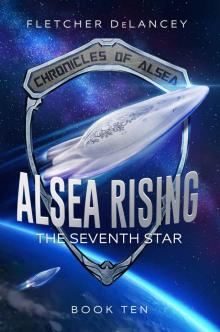 Alsea Rising: The Seventh Star (Chronicles of Alsea Book 10)
Alsea Rising: The Seventh Star (Chronicles of Alsea Book 10) Far Enough
Far Enough The Caphenon
The Caphenon Catalyst
Catalyst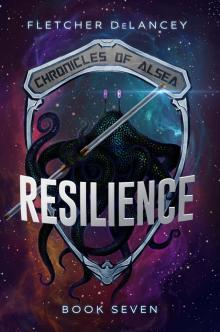 Resilience
Resilience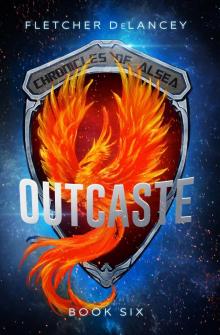 Outcaste
Outcaste Without a Front: The Warrior's Challenge (Chronicles of Alsea Book 3)
Without a Front: The Warrior's Challenge (Chronicles of Alsea Book 3)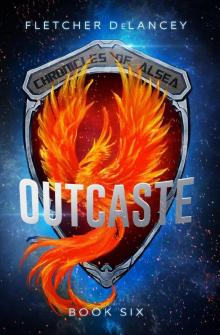 Outcaste: Book Six in the Chronicles of Alsea
Outcaste: Book Six in the Chronicles of Alsea Without a Front
Without a Front Do You Feel What I Feel. a Holiday Anthology
Do You Feel What I Feel. a Holiday Anthology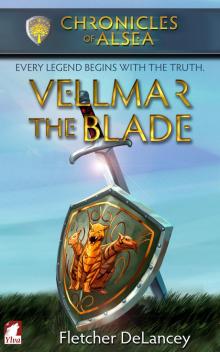 Vellmar the Blade
Vellmar the Blade Mac vs. PC
Mac vs. PC